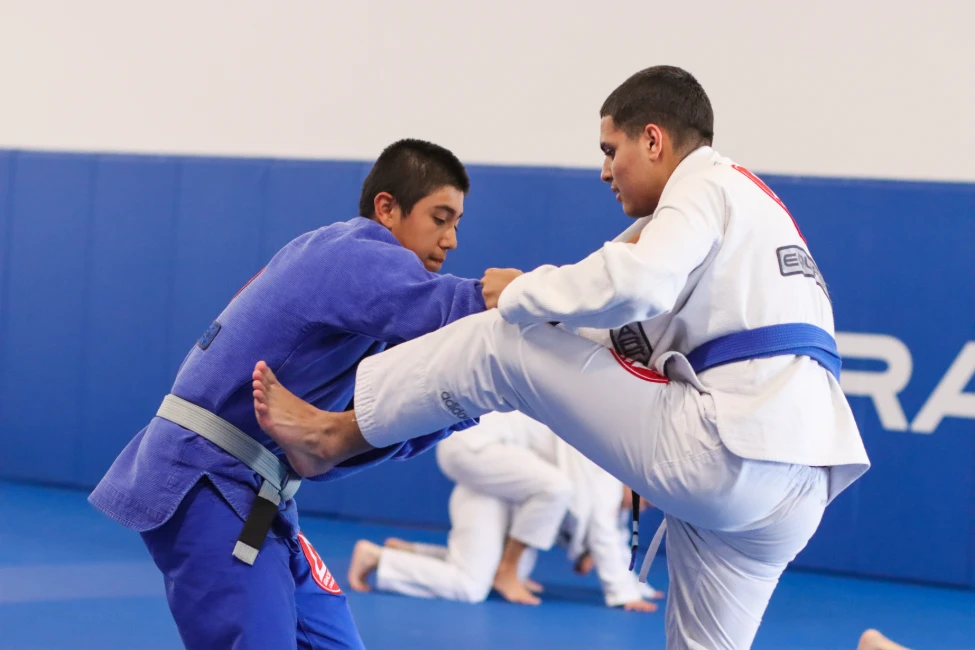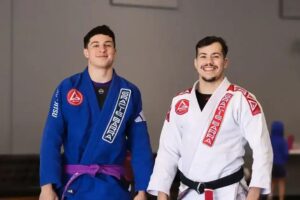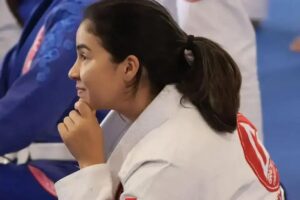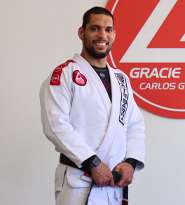Are you considering Jiu-Jitsu classes to enhance your safety in everyday life? In a world where unpredictable situations can arise at any moment, having the tools to protect yourself is invaluable. “Brazilian Jiu-Jitsu (BJJ) is not just a sport or self-defense method; it’s a comprehensive system that empowers individuals to handle challenging situations with confidence and composure,” Head Professor Seidler Rodrigo Ziser explains. Unlike traditional martial arts, Jiu-Jitsu focuses on real-world applicability, offering effective techniques for people of all sizes and strengths.
“At Gracie Barra West Jordan, we emphasize the practical aspects of self-defense, ensuring our students are equipped to handle everyday challenges,” says Prof. Rodrigo. Whether learning how to escape an aggressive hold, maintaining situational awareness, or staying calm under pressure, Jiu-Jitsu provides a unique approach to personal safety. These are skills that not only enhance your physical preparedness but also boost your mental resilience and confidence. “Our classes provide step-by-step guidance, making them suitable for everyone, from beginners to experienced practitioners.”
1. The Fundamentals of Self-Defense in Jiu-Jitsu Classes
Unlike other martial arts that focus on striking, Brazilian Jiu-Jitsu prioritizes leverage, technique, and strategy. These principles allow practitioners to defend themselves effectively, even against larger and stronger opponents.
Professor Rodrigo explains, “Jiu-Jitsu teaches you how to remain calm under pressure. It’s about control, not aggression. The ability to neutralize a threat without causing harm is what makes BJJ unique.”
Learning to escape holds, counterattacks, and maintain composure are fundamental aspects of Jiu-Jitsu classes. These skills prepare students for various real-world scenarios, from managing aggressive confrontations to avoiding physical harm. Also, these techniques emphasize energy efficiency, allowing smaller individuals to overcome physically dominant opponents with precision and strategy.
Jiu-Jitsu also teaches students how to recognize and avoid potentially dangerous situations, empowering them to make smart decisions before conflict arises. This proactive approach is critical for staying safe in unpredictable environments.
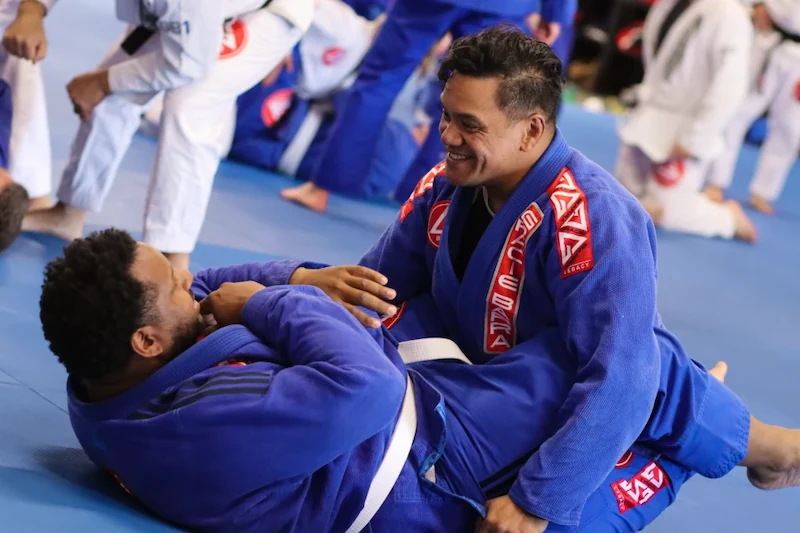
2. Situational Awareness and Confidence
Jiu-Jitsu classes teach more than just physical techniques; they emphasize situational awareness and the importance of staying alert in everyday environments. Recognizing potential risks before they escalate can often prevent a dangerous situation from occurring.
Professor Andrea Warner, lead instructor of the women’s-only class, adds, “Awareness is your first line of defense. By staying mindful of your surroundings, you can make smarter decisions to avoid trouble altogether.”
Students often report a significant boost in confidence after starting BJJ. This newfound self-assurance stems from knowing they can rely on their training to handle unexpected situations. For example, students learn how to manage confrontations without escalating them, reducing the likelihood of harm for themselves and others.
In addition to teaching awareness, Jiu-Jitsu classes build the ability to project confidence, which can act as a deterrent to potential aggressors. A confident posture and demeanor, reinforced by BJJ training, can often prevent situations from escalating.
3. Practical Techniques for Everyday Safety
Defensive Techniques for Public Spaces
In public settings, knowing how to defuse an aggressive situation is invaluable. Jiu-Jitsu classes teach techniques like maintaining distance, creating space, and safely disengaging from an attacker. These skills are especially useful in crowded areas like parking lots, public transportation, or events. Practical drills simulate real-life scenarios to ensure students are prepared for unexpected situations.
Control Without Escalation
One of the most powerful aspects of Jiu-Jitsu is its ability to control a situation without escalating it. By focusing on holds and submissions rather than strikes, practitioners can neutralize threats without causing unnecessary harm. This approach is particularly important in situations where the goal is to ensure safety without engaging in excessive force, such as workplace conflicts or disputes in public areas.
By regularly practicing these techniques, students develop quick reflexes and a clear understanding of how to respond effectively to various threats.
4. Mental Preparation and Emotional Resilience
A significant part of staying safe is mental preparedness. Jiu-Jitsu trains students to stay calm and focused, even in high-pressure situations. Techniques such as controlled breathing and maintaining presence of mind help reduce panic and improve decision-making during emergencies.
One student from Gracie Barra Salt Lake City shared, “I used to experience fear paralysis in uncomfortable situations. Since starting Jiu-Jitsu, I’ve learned to control my breathing and react with purpose. Now, I step forward instead of backing away in fear.”
Professor Andrea emphasizes, “Building emotional resilience is just as important as physical training. When you’re mentally prepared, you can handle challenges more effectively, both on and off the mats.”
Jiu-Jitsu also encourages a growth mindset, where setbacks are viewed as opportunities to learn and improve. This mental shift not only enhances self-defense skills but also fosters greater confidence and perseverance in daily life.
5. The Importance of Regular Training in Jiu-Jitsu Classes
Consistency is key to mastering the skills taught in Jiu-Jitsu classes. Regular practice ensures that techniques become second nature, allowing students to react instinctively in real-world scenarios.
Professor Rodrigo notes, “You don’t just learn Jiu-Jitsu—you internalize it. The more you train, the more confident and prepared you become to face any situation.”
Frequent training sessions also help build muscle memory, ensuring that responses to physical threats are automatic and efficient. By repeating drills and sparring with a variety of partners, students gain the adaptability needed to respond effectively to a range of real-world challenges.
Jiu-Jitsu classes also foster a sense of community, where students encourage one another to stay consistent and motivated. This support network enhances the overall learning experience and keeps students engaged.
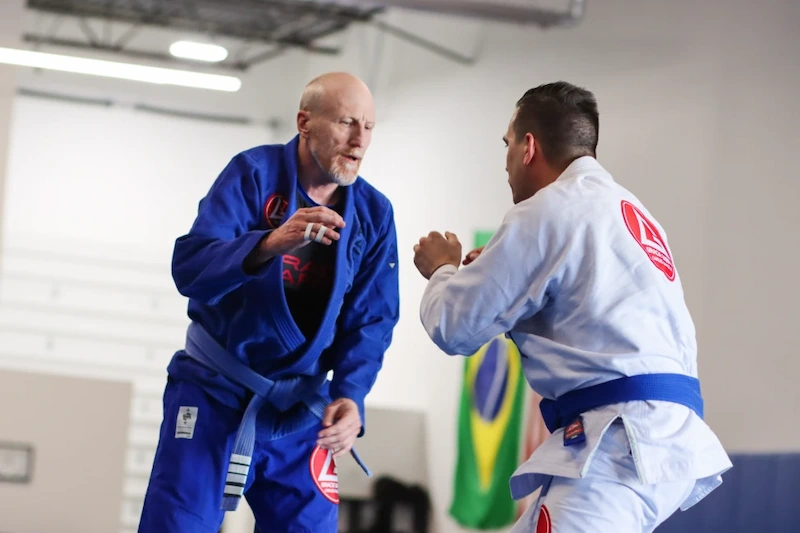
Why Choose Gracie Barra West Jordan for Jiu-Jitsu Classes?
Gracie Barra West Jordan is committed to helping students develop the skills and mindset needed to stay safe in everyday life. With expert instructors like Professors Rodrigo and Andrea, you’ll receive comprehensive training in a supportive and welcoming environment.
Professor Andrea adds, “We focus on building confidence, not fear. Our goal is to empower every student, regardless of their background or fitness level.”
Our Jiu-Jitsu classes are tailored to individual needs, ensuring that each student progresses at their own pace. Whether you’re a beginner or have prior martial arts experience, Gracie Barra West Jordan offers a structured path to personal safety and growth.
Schedule Your Free Trial Class Today
If you’re ready to take the first step toward safety and confidence, join our Jiu-Jitsu classes at Gracie Barra West Jordan. Contact us today to book a FREE trial class and discover the life-changing benefits of Brazilian Jiu-Jitsu!
Frequently Asked Questions (FAQ)
What makes Jiu-Jitsu classes unique compared to other martial arts?
Jiu-Jitsu focuses on leverage, technique, and strategy, allowing practitioners to defend themselves effectively against larger and stronger opponents. Unlike striking-based martial arts, BJJ emphasizes control and neutralization, making it highly practical for real-world situations.
Can anyone join Jiu-Jitsu classes, regardless of fitness level?
Yes! Jiu-Jitsu is designed to be inclusive and adaptable. Whether you’re a beginner or an experienced athlete, you can train at your own pace and gradually build your skills and fitness.
How do Jiu-Jitsu classes improve situational awareness?
BJJ teaches students to stay alert and recognize potential threats before they escalate. Through drills and real-life scenario training, students learn how to anticipate and respond to challenges effectively.
Are Jiu-Jitsu classes effective for self-defense?
Absolutely. Jiu-Jitsu classes equip students with techniques to defend themselves in various situations, such as escaping holds, neutralizing attackers, and safely disengaging from confrontations.
How often should I attend Jiu-Jitsu classes to see progress?
We recommend attending classes two to three times a week for consistent progress. Regular training helps build muscle memory and confidence, making techniques second nature.
What mental benefits can I expect from Jiu-Jitsu classes?
Jiu-Jitsu helps develop emotional resilience, focus, and a calm mindset. Students learn to stay composed under pressure and view challenges as opportunities for growth.
Why choose Gracie Barra West Jordan for Jiu-Jitsu classes?
Gracie Barra West Jordan offers expert Jiu-Jitsu training, a supportive community, and a curriculum tailored to individual progress. Our focus on personal safety and growth makes us a top choice for students of all backgrounds.

